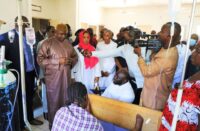Local products have to be Tested in neighbouring Countries before being exported to the International Markets
By Madi S. Njie
The European Union Delegate’s reminders of The Gambia international standards obligations, underpin by the disturbing aflatoxin – groundnut infection – causing liver cancer, among related diseases caused by infected groundnuts- such as asthma; and the absence of lab testing facilities for our local products bound for export were major topics that dominated the information sharing session organized for National Assembly Members by The Gambia Standard Bureau.
Papa Secka, Director General of The Gambia Standard Bureau (TGSB) alluded to the above mention, while sharing the objectives, activities and challenges of the Bureau with deputies who enacted the Bill in a day session in celebration of International Standards Days.
Mr Secka among others acknowledged the declining groundnut yield (The Gambia’s main cash crop) while trying to compete in the international market due to lack of Testing facilities in the country, noting that the EU in June 2019 reminded The Gambia of its international Standards obligations.
Established by an Act of Parliament in 2010, The Gambia Standards Bureau Act it began operations in October 2011.
Mr Secka noted that The Gambia is facing lot of challenges, and there is need for the Bureau to harness challenges, particularly on groundnut, promote and make the sector more efficient, which remains a major challenge.
Secka was speaking at the opening ceremony of the information sharing session on the role of the Bureau and National Quality Infrastructure with all the National Assembly Members held at the Senegambia Beach Hotel on 31st October 2019. The session was part of commemoration of World Standards Day 2019.
“After knowing the challenges we should know how to address challenges by harnessing the role of the Bureau,” he said.
He highlighted training and sensetisation needs, hence prompting the event to sensetise National Assembly Members to remind them about the role of the Bureau, work done and identify areas to contribute to national development, to enable them sensetise their respective constituencies.
Hon. Kebba Secka Majority Leader reiterated that GBS was established …, to take care of health of the Nation, by enhancing standards.
Hon. Secka also alluded to concerns on threats posed by aflotoxin (groundnut infections) which are human transferable infections, and therefore advised the bureau to collaborate the Ministry of Agriculture to tackle the epidemic, as means of enhancing standards.
Described the workshop as timely, Hon Kebbeh noted the importance of sensetising the public, adding that this is the beginning of their collaboration with bureau, to enhance standards.
Hassoum Gaye, a representative from the Ministry of Trade, Industry and Employment expressed the needs for The Gambia to adapt to international standards, noting that our products need to compete internationally, assuring his Ministry’s support
Mr Gaye said our agriculture sector needs to compete at international level by adapting to globally accepted standards; adding that currently The Gambia is working to have food safety testing standards.
Presentations on Standardisation, conformity assessment, and metrology were done by Mr Amadou G. Jallow, Awa Jeng and Mr Papa Secka all staff of the Standards Bureau.
Participants highlighted challenges, including lack of resources, training, and food testing machine, and came up with recommendations.
Mr Sambujang Drammeh – Marketing and communication Officer at the Standard Bureau Chaired the opening ceremony.
GBS Vision is to be the leading standardisation institution in promoting industrial growth and consumer welfare.
GBS’ Mission is to standardise goods, services and systems in accordance with internationally-recognised procedures to enhance industrial growth and efficiency, facilitate trade, promote health, safety and environmental protection.
Global drives to enhance standards dated back to 20 May 1875 by 17 States, with the establishment of BIPM- Bureau International des Poids et Mesures set up by the Metre Convention, in Paris, France. It maintains scientific laboratories in areas of mass, time, electricity, ionising, radiation and chemistry.
Functions of BIPM includes establish fundamental standards and scales for the measurement of the principal physical quantities and maintain the international phototypes



